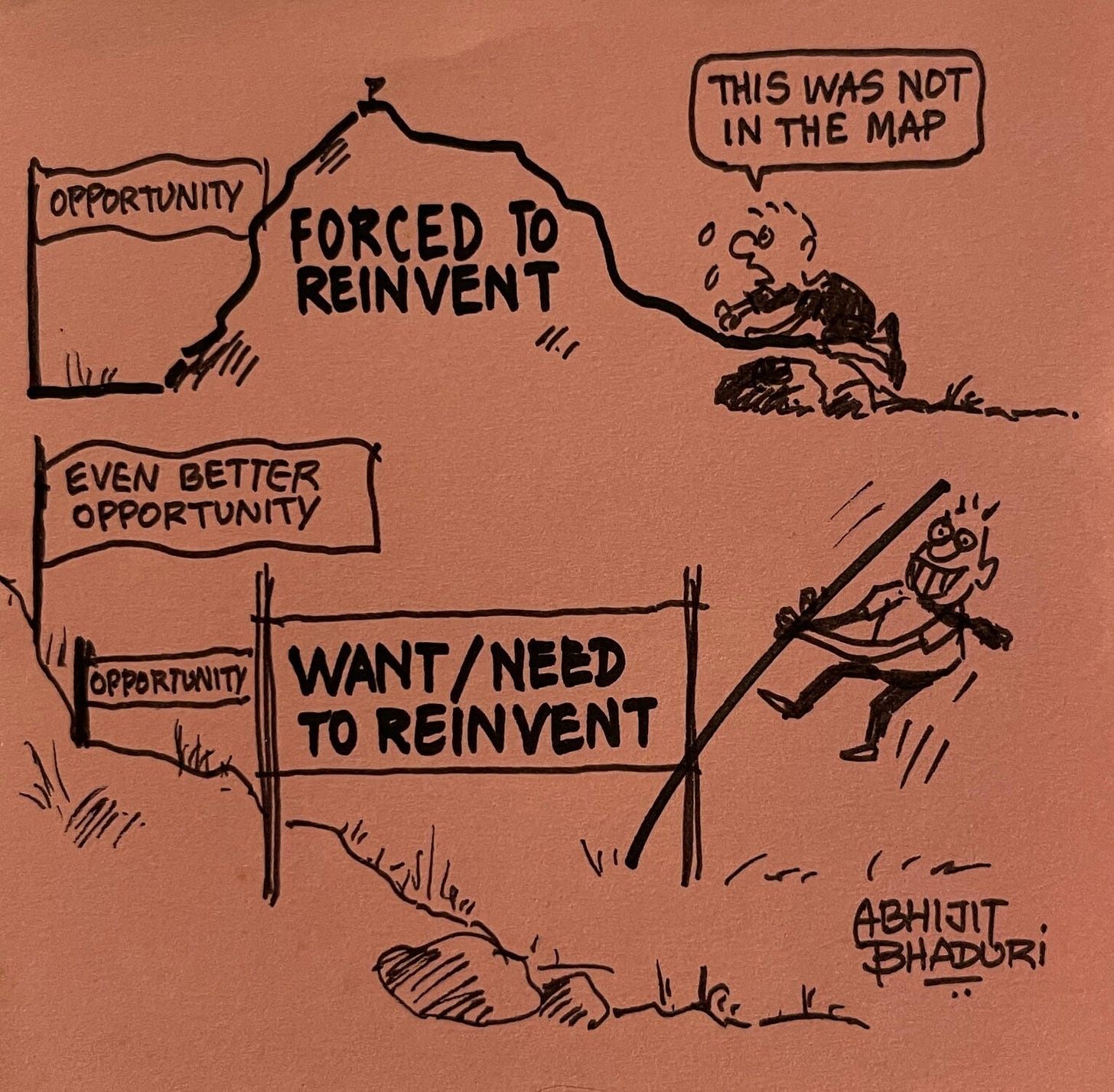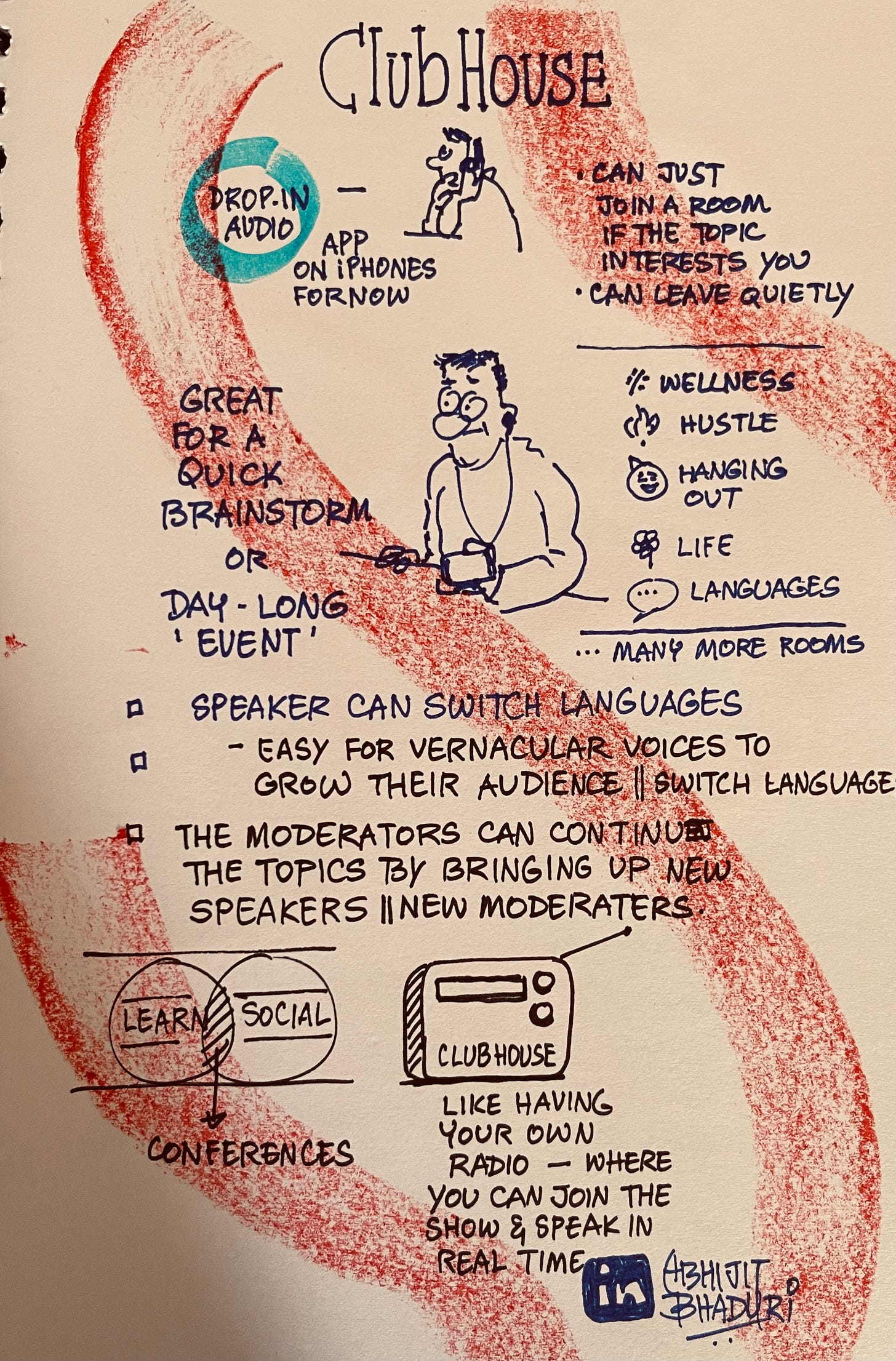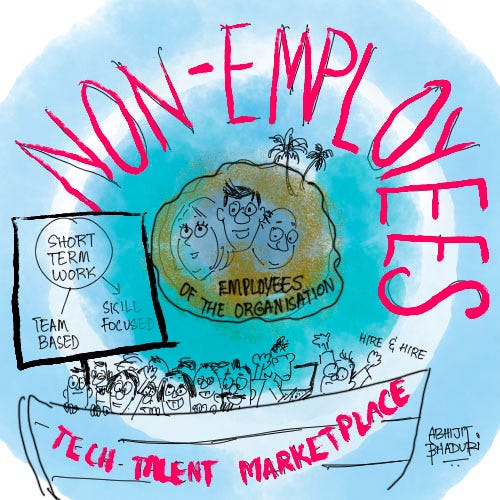Welcome to the 36th edition of this newsletter. This has all the ideas that made me curious. To get this newsletter in your mailbox every Monday at 9:00am IST, just add your email here
The Big Idea
Last week the VP of Talent Management for a French MNC wrote to me and talked about having reinvented his career multiple times already.
(I have) “shifted career tracks thrice in my career (UX designer, Leadership Consultant and Talent Manager) - and anticipating more shifts on the way!”
Reinventing oneself every three to five years has become the norm. Every role has an expiry date stamped on it.
The world of work is seeing shifts because of three drivers:
Innovation kills old businesses and business models. This is bringing down the life of organisations
Employers want new skills to stay competitive. Lifetime employment is going away.
Humans are living longer and will need to reinvent themselves ever so often
What are adjacent skills and leap skills that become critical in the process of reinvention? Dig Deeper
What do you see as the biggest barrier you may face while reinventing yourself?
Clubhouse - the hot new social app you must use
Clubhouse is the new social networking app that amplifies voices… literally. The new app uses audio to connect its users to others in various spaces from the arts, social justice, sports and more. Users convene in a virtual panel setting while listening to others talk about the topic at hand and listeners can even get the chance to speak with panelists.
It is right now only for iOS but will launch for Android users too shortly. Here is a fantastic read about the overall landscape of “drop-in audio” <long read>
I am excited about the possibilities that drop-in audio offers. I did a Clubhouse with Joshua Karthik. The theme was “Going from Idea to Building the Dream”.
We spoke of 3 hacks:
Building a “private stage”
“Learning” hacks
The “above average” hack
Our next Clubhouse between Joshua and me is on Sat Feb 6, 2021 at 6:45PM on How to Get Better at Completing Unfinished Tasks.
If you have tried Clubhouse, tell me about how you have found it to be useful or just a waste of time. Read more: How to get started on Clubhouse
If you follow me (@AbhijitBhaduri) on Clubhouse, click on the bell icon that will tell you when I am online. Create a room and ping me.
Try out this social site that is shaking up how we connect and communicate. If you have tried it, please share your experience here:
Talent moves from being “on-prem” to the cloud
Non-employees are responsible for performing more than 25% of work in the enterprise. Platforms now make it easier to engage workers for on-demand, task-specific work. This shift coincides with another: growth in the number of highly skilled creative or technical workers (such as data scientists) who prefer to work on specific types of projects for one or more companies.
These workforce trends pose three challenges:
There is no common process for businesses to manage the non-employees across various services.
Businesses have to choose between bringing the skill in-house (by hiring someone full-time) and working with the non-employees.
Maintaining a consistent culture is harder. When people hire for the short term, they are likely to overlook the fit.
Technology used to be brought physically into the building or on premises “On-Prem”. The tech giants like Facebook, Apple, Amazon, Netflix and Google were built in that era. Then technology moved to the cloud.
Talent models have been “On-Prem” for the last hundred years or so. It is now getting distributed and run through the cloud. It is time for the next set of Market Shapers to emerge from this churn. Silicon Valley brought together a talent ecosystem - different skills, payment systems, great research and educational institutions etc, together in one location. With people working out of different locations, will it mean the end of Silicon Valley’s dominance or will the power just get distributed to two or three large players. Love to know what you think.
Building ‘Psychological Safety’
The ability to identify, understand, and manage emotions is the foundation for successful teamwork. Google’s Project Aristotle found that the most successful teams shared five traits: Psychological safety, dependability, structure and clarity, meaning, and impact.
Of these factors, building psychological safety is the hardest to build. Psychological safety is not the same thing as trust.
When you trust the team members, YOU GIVE OTHERS the benefit of doubt when you take a risk.
When you have psychological safety, you know that OTHERS WILL GIVE YOU the benefit of doubt when you take a risk. Here are some ideas to try out
Regularly ask your team, “How confident are you that you won’t receive retaliation or criticism if you admit an error or make a mistake?” I recommend that you do the survey anonymously until the team suggests that anonymity is not needed.
Clarifying roles. Ensure team members understand their respective roles and responsibilities, as well as how they contribute to the team’s purpose.
Looking at mistakes as a way of learning. The people who are responsible for creating a problem often hold the keys to solving it. That’s why a positive outcome typically depends on their input and buy-in.
The Future According to Frogs
Frog Design is one of the design firms I love. I love them enough to have taken a trip to their headquarters in San Francisco to study how they work. (More of that on another day).
They put together their prediction of the world. This time their usual method of looking at data, insights etc was replaced by a different method. They used fiction to predict trends.
Here is what they predict
Trend 1: Remote control
In a world where the line between home and office is nonexistent, workers will demand that their organisations provide better tools to enhance employee experience.
“Technology will start to be embedded into furniture to enable continuous videoconferencing, and eventually the sharing of virtual space.”
“Industries will explore opportunities of remote work which have not been thought of until now. With 5G high-speed internet connectivity, some existing work could be done remotely and people would not have to work in harsh conditions.”
Trend 2: Reality check
In a world where personalised, digital experiences extend into our daily lives, individuals will need to take personal control over how they experience their own reality.
If you liked this newsletter, will you please tap the heart symbol below and let me know. It means the world to me to know that it was worth the effort. Till we meet next Monday at 9:00am IST, stay curious, stay connected.
AbhijitBhaduri@live.com










